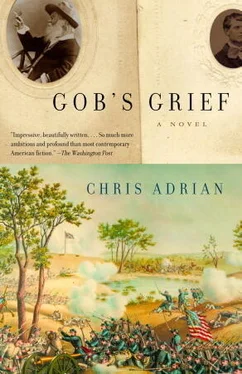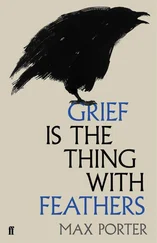“Clark is one hundred to Bradley’s sixty-five,” the man said.
Maci thought, Next he will ask me to show him my ankles. Two times before, reporters had asked her that, thinking she was Tennie. Once, on a whim, Maci had obliged, but she could not master Tennie’s maneuver, a standing skip and hop that flashed the ankles so briefly men were left wondering if they had been revealed at all. Maci had merely lifted her hem. The reporters had gone away from her disappointed, and, she thought, a little embarrassed for her.
“I’ll dash your hopes,” Maci said.
“Pardon?”
“A dash of hope. Perhaps Tammany is doomed, after all.”
“How did you injure your hand?”
“It’s a casualty of our war. I bruised it assaulting the walls that imprison my sex.”
“Let me kiss it, then. To speed the recovery.”
“Please do not,” Maci said, but he was already bending toward her big white mitt, which twitched and knocked him in the nose. He straightened up with his hand over his face.
“You are hard, Miss Stone,” he said, walking off, and not bringing her any more returns.
“If I let you out,” Maci asked her hand, “will you behave?” If it gave any sort of answer, Maci missed it, distracted by abrupt cheers that broke out all over the house. News had come from Rochester that Susan B. Anthony had successfully cast a ballot.
Until January of 1872, Mrs. Woodhull always had just as many New Year’s visitors as were due a lady who was famous, beautiful, daring, and consistently more interesting than anyone else, male or female, in a city full of daily distractions and ever-hatching novelty. The previous year, Maci had barely been able to walk through the house because it was so crowded. But now no one came to eat from tables set in magnificent style, to drink the brandy and whiskey and lemonade and punch. Mrs. Woodhull seemed to have driven away all her friends with the lecture she’d given two months before at Steinway Hall, or all except Mr. Andrews (who could never be shocked or out-radicaled by anyone, even Mrs. Woodhull). Maci, sitting down next to Mrs. Woodhull and listening to clocks ticking all over the quiet house, thought back to that wet, disagreeable night in November.
“Yes, I am a Free Lover!” Mrs. Woodhull had exclaimed. She hadn’t been supposed to say that. It was an unfortunate departure from the text Maci had written, a reasonable discourse on social contracts which meant to demonstrate that freedom in the social sphere was no less desirable, and no more immoral, than freedom in the political and religious spheres. Mrs. Woodhull departed from the text after her sister, drunken, despicable Utica, heckled her from a box where she leaned against her escort, a man in green spectacles who hissed like a furious kitty all during the lecture. Hissing and boos came like that from the smaller part of the audience. Mrs. Woodhull ignored them. But when Utica stood up and demanded to know how Mrs. Woodhull would like it if she was a bastard, then asked if she was a damned Free Lover, she stirred her sister’s passion. Mrs. Woodhull got such an awful and majestic look on her face that the first five rows fell absolutely silent. Just with her gaze, Mrs. Woodhull seemed to fling Utica back into the recesses of her box. Then she spoke some words which delighted the reporters, but distressed Maci.
“I have,” Mrs. Woodhull said, loud and clear, “an inalienable, constitutional, and natural right to love whom I may, to love as long or as short a period as I can; to change that love every day if I please, and with that right neither you nor any law you can frame has any right to interfere. And I have the further right to demand a free and unrestricted access of that right, and it is your duty not only to accord it, but, as a community, to see that I am protected in it. I trust that I am fully understood, for I mean just that, and nothing less!”
For the party, a New Year’s hair artiste had given Maci an enormous hairdo to match Tennie’s and Mrs. Woodhull’s. It made her head feel very large, and gave her the shadow of a monster. Maci stared at her hands where they lay folded in her lap. She’d freed her left hand two weeks before. It seemed a little shriveled up now from disuse, though it was vigorous as ever, if more polite, when it wielded a pen.
“Was that the door?” Mrs. Woodhull would ask, every so often.
“No,” Tennie would say. Colonel Blood and the senior Dr. Woodhull were playing chess. Once in a while, Canning Woodhull would bemoan a loss, but otherwise it remained silent. Maci almost wished she hadn’t arranged for all the noisemaking Claflins to be sent away for the day. She went often to the window, where she could see little crowds of people passing from house to house, some of them already drunk on whiskey and punch, stumbling on the ice. Many passed by, but none stopped.
Maci had quite given up hope of there being any callers at all when the bell finally rang. Mrs. Woodhull leaped up and shouted for a servant to open the door. But it was only Gob Woodhull, with little Pickie in tow. Dr. Fie was not with him. Maci was certain he must be back at the house on Fifth Avenue, building on the machine. Was it noble to share your friend’s delusion, or merely foolish? Maci didn’t know. Dr. Fie was sullen and grim, very much the opposite of Tennie, yet Maci was sure those two would have married if Tennie had not considered marriage a terrible sin.
Mrs. Woodhull’s son was not surprised at the empty house. “You have frightened people away from you,” he said. “The timid and the hypocritical, who do not understand how your notions are refined, indict you with your own words. You ought not to have strayed from your text.” It was a sign, Maci thought, that he was concerned for his mother, that he scolded her for being too bold. It was Maci’s aim to make him an ally in his mother’s cause, and to lessen the distance that seemed to stretch between the two of them. She’d imagined a scene between them, in which, fully reconciled and truly loving, they embraced, and in which Mrs. Woodhull would say, “Come into the world. There is so much work for us to do, here.”
“Oh, you are like a croaking bird, with that refrain!” said Mrs. Woodhull to her son. But Maci, too, had been telling her all month how she had made a mistake at Steinway Hall. And Maci had been telling her, also, that she should not have marched at the head of the December parade protesting the execution of M. Rossel, one of the Paris Communards. Mrs. Woodhull had walked behind a black-draped coffin, while Maci and Tennie had followed carrying a banner that read, Complete Social and Political Equality for Both Sexes.
It was the most self-evident of facts, that there was no profit in associating with Communists. Maci knew that, and yet she had marched anyhow with Mrs. Woodhull, because she couldn’t refuse her anything. Maci had been constantly afraid that they would spark a riot, that by evening bodies would be piled on all the corners of Manhattan, and the city would be in flames. But the march had wreaked a different sort of havoc — the two sisters’ participation alienated Commodore Vanderbilt. Free Love excited him, Spiritualism comforted him, but Communism was anathema to him. Tennie announced one morning a few days after the march that he wouldn’t see her anymore. “I knew it would happen,” she told Maci. “But oh, it still hurts!”
At her guestless party, Mrs. Woodhull shook her head at her son, then went to sit down between her two husbands, who had given up their chess game and retired to a sofa. “It’s a hot January for us, isn’t it?” she said. “Well, I am inclined to make it hot for somebody else.” It had become a reflex with her, to threaten Henry Beecher whenever her fortunes dipped. She’d come to blame him for most of her troubles, though, as far as Maci could tell, he hadn’t actually done anything to hurt her. It was Mrs. Stowe and Catharine Beecher who wanted to destroy her. Mr. Beecher had, in fact, made an attempt to rein his sisters in, but, frenzied with hypocrisy and vituper, they would not be silenced.
Читать дальше












